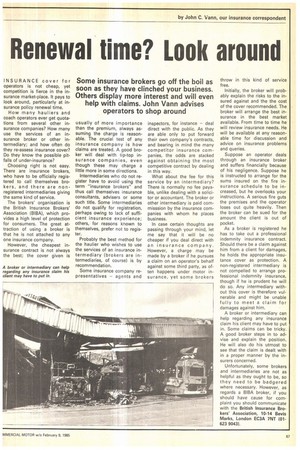Renewal time? Look around
Page 71

If you've noticed an error in this article please click here to report it so we can fix it.
Some insurance brokers go off the boil as soon as they have clinched your business. Others display more interest and will even help with claims. John Vann advises operators to shop around
INSURANCE cover for operators is not cheap, yet competition is fierce in the insurance market-place. It pays to look around, particularly at insurance policy renewal time.
How many hauliers and coach operators ever get quotations from several other insurance companies? How many use the services of an insurance broker or other intermediary; and how often do they re-assess insurance cover? Do they know the possible pitfalls of under-insurance?
Choosing right is not easy. There are insurance brokers, who have to be officially registered to call themselves brokers, and there are nonregistered intermediaries giving the same kind of service.
The brokers organisation is the British Insurance Brokers' Association (BIBA), which provides a high level of protection for consumers. The great attraction of using a broker is that he is not attached to any one insurance company.
However, the cheapest insurance contract is not always the best; the cover given is usually of more importance than the premium, always assuming the charge is reasonable. The crucial test of any insurance company is how claims are treated. A good broker will deal with tip-top insurance companies, even though these may charge a little more in some directions.
Intermediaries who do not register have to avoid using the term "insurance brokers" and thus call themselves insurance consultants, advisers or some such title. Some intermediaries do not qualify for registration, perhaps owing to lack of sufficient insurance experience; others, for reasons known to themselves, prefer not to register.
Probably the best method for the haulier who wishes to use the services of an insurance intermediary (brokers are intermediaries, of course) is by recommendation.
Some insurance company representatives — agents and inspectors, for instance — deal direct with the public. As they are able only to put forward their own company's contracts, and bearing in mind the many competitor insurance companies, the odds are stacked against obtaining the most competitive contract by dealing in this way.
What about the fee for this service by an intermediary? There is normally no fee payable, unlike dealing with a solicitor or accountant. The broker or other intermediary is paid cornmisssion by the insurance companies with whom he places business.
In case certain thoughts are passing through your mind, let me say that it will be no cheaper if you deal direct with an insurance company. However, a charge may be made by a broker if he pursues a claim on an operator's behalf against some third party, as often happens under motor insurance, yet some brokers throw in this kind of service free.
Initially, the broker will probably explain the risks to the insured against and the the cost of the cover recommended. The broker will arrange the best insurance in the best market available. From time to time he will review insurance needs. He will be available at any reasonable time for discussion and advice on insurance problems and queries.
Suppose an operator deals through an insurance broker and suffers financially because of his negligence. Suppose he is instructed to arrange for the sums insured on the fire insurance schedule to be increased, but he overlooks your instructions. A serious fire guts the premises and the operator loses out quite heavily. Then the broker can be sued for the amount the client is out of pocket.
As a broker is registered he has to take out a professional indemnity insurance contract. Should there be a claim against him from a client for damages, he holds the appropriate insutance cover as protection. A non-registered intermediary is not compelled to arrange professional indemnity insurance, though if he is prudent he will . do so. Any intermediary without this cover is therefore vulnerable and might be unable fully to meet a claim for damages against him.
A broker or intermediary can help regarding any insurance claim his client may have to put in. Some claims can be tricky. A good broker steps in to advise and explain the position. He will also do his utmost to see that the claim is dealt with in a proper manner by the insurers concerned.
Unfortunately, some brokers and intermediaries are not as helpful as they ought to be, so they need to be badgered where necessary. However, as regards a B1BA broker, if you should have cause for complaint you should communicate with the British Insurance Brokers' Association, 10-14 Bevis Marks, London EC3A 7NT (01623 9043).


































































































